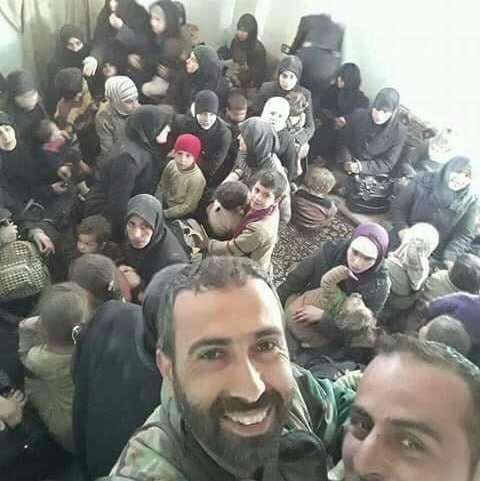Pro-Assad forces closed on Friday on the reoccupation of East Ghouta, near Syria’s capital Damascus, after a seven-week offensive on the besieged territory which has killed more than 1,600 people, wounded thousands, and displaced tens of thousands of civilians.
The opposition capitulated in almost all of the remaining towns, after Harasta gave way earlier in the week with 7,500 rebels and their families removed to northwest Syria.
See Syria Daily, April 22: 7,500 to Leave in Capitulation Deal in East Ghouta’s Harasta
Only Douma, the center of East Ghouta, remains to be recaptured after the mass killing by the Assad regime, Russia, and other foreign allies in the area, held by the opposition since 2012.
Pro-Assad forces celebrated on Friday night, firing tracer bullets into the air, as people boarded the green buses — a symbol of the displacement of civilians as well as the removal of fighters — in Harasta.
Rebels in the pocket of Arbin — where scores of people have been burned or crushed to death this week by incendiary bombing — Jobar, Zamalka, and Ain Terma said they have also accepted the removal arrangements. State media said about the removal of about 7,000 people will begin on Saturday morning.
The opposition said that, in both Harasta and the Arbin pocket, guarantees have been given that those who remain will not face detention.
In other areas which have capitulated, such as eastern Aleppo city in December 2016, Assad regime forces have reportedly detained men or forced them into the military.
The Ahrar al-Sham group had been the leading rebel group in Harasta, while Failaq al-Rahman had defended the pocket including Arbin.
Jaish al-Islam, the faction defending Douma, has been negotiating through the UN with Russia, but is still debating terms of a surrender.
Pro-Assad forces maintained the bombing of Douma on Friday. The siege — begun in 2012 and tightened from early 2017 killing scores of civilians from lack of food and medicine in recent months — also continues.
The final video of pro-opposition activist Nour Adam from East Ghouta:
This is the last video I took yesterday just Watch and you will Know what we have seen and what we have suffered and all of you have left us #alone#EastGhouta
See you in another life#NourAdam pic.twitter.com/HDKmQ8v7QO— Oways Alshami (@OwaysAlshami) March 23, 2018

